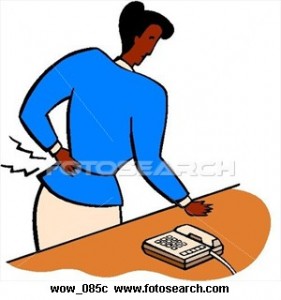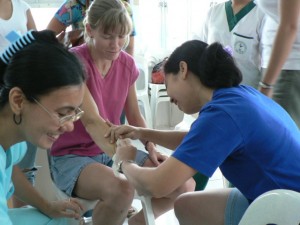I was once again called up in the middle of the night to insert an IV to a laboring patient. The staff in the Lying clinic where I worked before needed help for it. So I went there and of course, I prayed and ask God to guide my hand and be able to insert the IV cannula successfully in one try since the patient had couple of poke already. God did answered my prayer. I was able to insert it without any problems. I used to insert it in the cephalic vein. I like that site because it big compare to the other veins. At the same time, it is not hard for the patient since she can move her hand without dislodging the IV cannula. There is no need for a splint which make her hand immobile.
The laboring patient needs to be induced for her labor did not progress so I she needs one so that medication will be given to her via IVTT (intravenous through tubing). After the insertion I went back home feeling good about myself that I was able to help someone.
Archive for the ‘nursing’ Category
Not that nurses should refuse orders
Wednesday, January 21st, 2009I am reminded today of what our clinical instructors emphasized to us when we were still student nurse. They told us that as nurses we ought not to carry all of the doctors orders. Everyone of us makes mistakes. Nobody is perfect. Nurses make mistakes and doctors too. So as nurses we need to be very careful and knowledgeable enough to know what orders are right or wrong. It is not that we should refuse doctors’ orders but we are responsible for knowing better if we are told by a doctor to do the wrong thing. We are legally responsible in carrying out orders that are not right. So we should better know our stuff. But we need to play closely with the team, and get orders written. When we detect that the order is wrong, we have to approach the doctor in a professional an unoffensive manner. Nurses should not act as all knowing nurse. Doctors will hate you. We should work hand in hand as a team for the sake of all our patients.
Baby your back
Saturday, December 6th, 2008 Most of us experiences back pains. It is not fun to have them. Delivering babies sometimes made my back hurts. So we need to baby our back and give them a break.
Most of us experiences back pains. It is not fun to have them. Delivering babies sometimes made my back hurts. So we need to baby our back and give them a break.
If you’re a working adult, the odds are fifty-fifty that you’ll suffer back trouble. To help you avoid this wrenching experience, the American College of Occupational and Environmental Medicine recommends the following back-saving strategies on the job:
• Alternate between sitting and standing. When sitting, rest your feet flat on the floor, and use a chair with good back support. When standing for prolonged periods, rest one foot on a low stool.
• As you lift heavy objects, hold them close to your chest; bend your knees, not your back; and reposition our entire body rather than twisting or reaching as you lift.
• Split heavy loads into smaller loads, and get help when an object is too heavy or awkward to lift by yourself.
• To help protect your back overnight – or whenever you lie down – use a firm mattress, and lie on your back or side, not on your stomach.
• When driving, adjust the seat to keep your knees level with your hips, sit up straight with both hands on the wheel, and use a lumbar support for your lower back. Keep vehicles in good repair to minimize vibration. Take frequent rest breaks to change position and stretch.
Feminine Hygiene tips
Tuesday, December 2nd, 2008I am caring for pregnant women, I always see to it that I teach them about the importance of feminine hygiene. Pregnant women are prone to genital infection due to the change in the natural pH of the external genitalia. The following are the tips on feminine hygiene. Take this short course on feminine hygiene and graduate from bad, ineffective hygiene practices.
• Change underwear twice a day or as often as needed.
• Wear cotton panties and avoid wearing too tight pants to allow your skin to breathe. Allowing air in and moisture out is one way of avoiding yeast infection.
• Do not scrub your external genitalia with a wash cloth. Wash cloths are abrasive and might just irritate your sensitive skin. Use your hand, a small amount of feminine wash and warm water instead.
• If washing with water is not possible after urinating, use damp tissue instead. Pat dry, not rub, with dry tissue right after.
• To prevent menstrual cramps, exercise regularly, drink ten to 12 glasses of water per day and eat plenty of fresh fruits and vegetables.
• Change your sanitary napkin as often during heavy days. On light days, change every three to four hours to avoid growth of bacteria that may cause itching and irritation.
• To keep yourself clean and smelling fresh down there, use a clinically proven pH-balanced feminine wash everyday. Avoid using soaps and antiseptics for cleansing your external genitalia. Soaps and antiseptics may be too harsh for you because these strip off the protective barrier of your external genitalia.
What is Lactose Intolerance?
Tuesday, November 18th, 2008In my field of practice, I only see few cases of lactose intolerance in babies. We need to know about it since we don’t know our own babies may have one. Lactose intolerance is the body’s reduced capacity to digest lactose the main sugar in dairy products.
Normally, lactose is digested by lactase, the enzyme present in the lining of the small intestine. A lactase deficiency prevents complete lactose absorption. Lactose intolerance affects around 70 percent of individuals worldwide.
The common symptoms are: babies may experience stomach pain, diarrhea, bloating, and gas or colic. These are due to the failure of the intestine to efficiently process lactose, resulting in frequent and acidic stools. Diarrhea causes fluid and electrolyte imbalance, which leads to dehydration and even death in severe cases.
Lactose intolerance appears to increase during childhood for unknown reasons. Late onset of lactase deficiency develops between three and five years of age. Most lactose- intolerant individuals are able to absorb 24 t0 36 percent of the quantity tolerated by normal individuals. This is a approximately equivalent to eight to 12 ounces of milk.
Bathing a baby
Friday, November 14th, 2008 I like bathing babies. Many times I let the fathers do the bathing of thier newborn babies. I really like teaching them how so that at home they will be the ones to bath their babies. I think that it is fair enough that fathers take care of that aspect. Their wives did all the work pushing their babies out. They deserve to have adequate rest and sleep. I usually tell the fathers that since babies are very fragile, they need to take every precaution in ensuring their baby’s comfort and safety. Some helpful reminders are :
I like bathing babies. Many times I let the fathers do the bathing of thier newborn babies. I really like teaching them how so that at home they will be the ones to bath their babies. I think that it is fair enough that fathers take care of that aspect. Their wives did all the work pushing their babies out. They deserve to have adequate rest and sleep. I usually tell the fathers that since babies are very fragile, they need to take every precaution in ensuring their baby’s comfort and safety. Some helpful reminders are :
• Choose a place to bathe the baby where it is warm and draft-free. It would be better if you keep the windows closed.
• See to it that baby’s bath time happens before feeding or when he’s not too hungry yet. Bathing him right after feeding may make him uncomfortable and he may spit up.
• Make sure that everything you need in bathing baby is close at hand, such as towels, cotton tips, a soft washcloth or sponge, a changing mat, clean baby clothes, and bathing products.
• To ensure that the water’s temperature is mild enough for baby, test the temperature of the bath water with the inside of your wrist first. To further prevent accidental burns, pour cold water in the tub.
• Always hold baby securely.
• Most importantly, never leave your baby alone.
 I was called the other night to insert and IV (intravenous) insertion. The patient really needed an IV so that the Induction of labor be started. The staff of the Lying In Clinic were not successful of inserting an IV so they called me up. I was almost ready to sleep when I received the call. I am very much willing to help them when they need to. I was praying that God would bless my hand to let me insert the dextrose successfully in just one poke. It felt a little bit stress because, somehow I doubted myself a little though I already done many insertions. I do not want to poke the patient twice since the patient had been poke like thrice with their try. It would be so shameful if I do not do it successful since they expected me to make it. I really prayed hard that God will help me with it. God answered my prayers. I did it successful in just one try. To God be the glory.
I was called the other night to insert and IV (intravenous) insertion. The patient really needed an IV so that the Induction of labor be started. The staff of the Lying In Clinic were not successful of inserting an IV so they called me up. I was almost ready to sleep when I received the call. I am very much willing to help them when they need to. I was praying that God would bless my hand to let me insert the dextrose successfully in just one poke. It felt a little bit stress because, somehow I doubted myself a little though I already done many insertions. I do not want to poke the patient twice since the patient had been poke like thrice with their try. It would be so shameful if I do not do it successful since they expected me to make it. I really prayed hard that God will help me with it. God answered my prayers. I did it successful in just one try. To God be the glory.